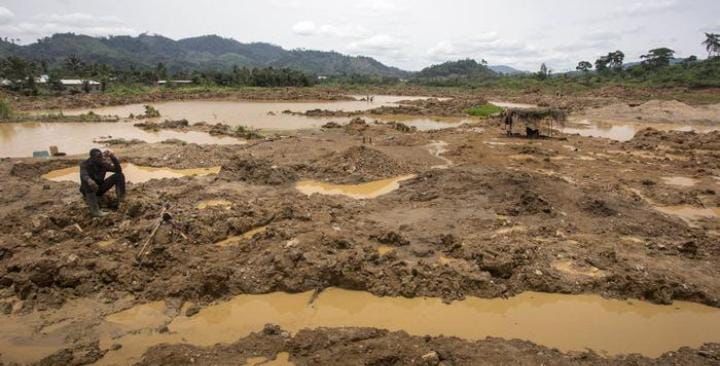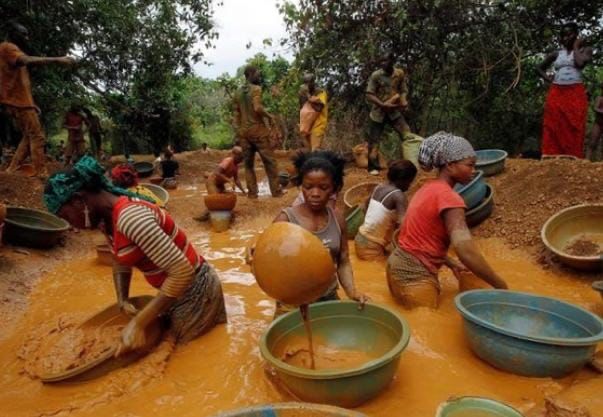Tropenbos Ghana, an NGO that influences forest policy and sustainable development, has called for more stringent measures to deal with the galamsey menace.
The Non-Governmental Agency believes that as a country “we need to redirect our efforts toward arresting the big players in the mining industry”.
The Project Manager for Tropenbos Ghana, Daniel Kofi Abu made this passionate appeal at a presser in Accra on Monday (October 10, 2022).
“The fight against Galamsey is a fight of war. You’re fighting people’s livelihood, people’s existence. It is a big fight and you need muscles to do that. Over the years, several projects have been rolled out. Some will say there is a political will but I will say there is a social will. Even so, we have targeted the wrong people over the years. The big fishes are roaming among us. We know them”.
“I often ask this question, how many of us can buy an excavator for a million Ghana cedis? How many of us can buy Changfang? We can’t! It is people with power, people with the resources, who can buy. Again, I ask, how many of us can acquire mining concessions? If they ask you to pay $5000 can you afford it? You and I cannot. Until we start addressing the real issues and arresting the ”big fishes”, the problem will still persist.
“That young man who just graduated from SHS and his only source of livelihood is to go and mine and be marked 50 cedis a day. If you arrest such a person you have done nothing. Let’s start dealing with the ”big fishes”. Enough of the talk shop and the usual rhetoric,” he stressed.

Mr Abu insists that the strategies put in place by successive governments are being sabotaged by the same institutions and leaders who have sworn to protect the lands.
“Normally when we talk about progressive nations, we don’t want to go far. Just Rwanda here. How dare you a Chinese or any other National go into their forest to go and mine. A country that has lost almost all its forest, today is one of the most forested countries in the world. We can get there. We just need to realign our policies.
“Our strategy is not working because we have saddled these offices with people who can only sing the song of what our politicians want to hear. We can’t fight galamsey doing the same thing. As I indicated, the fight against galamsey is a war. It’s a war against poverty, economic viability, and people’s shelter so we ought to have a strategy.
“There are a lot of institutional weaknesses. Most of our institutions mandated to fight galamsey are themselves involved. We know them. I am not here to tell you stories. Of course, the despair, hunger and frustrations will push the youth towards mining but we can’t blame them when the ”big fishes” are there,” he added.
Among other things, Mr Abu said, Ghana may soon import water if galamsey menace persists.
What are the implications of Galamsey
- Food security implications, for instance, a plunged land will take approximately 40 years to regain its strength
- The use of mercury and other chemicals has dire health implications that include cancers and other serious water-borne diseases
- Drought, climate change and consequences
- Cost of reclamation; it costs an average of $60,000 to reclaim 2 acres of mined land to a depth of 900mm
- Government loses nearly 11% of its GDP to environmental degradation; that’s approximately $7 billion annually

Proposed solutions
- Ban all related mining activities for the next five years
- Conduct an inventory of the state of our forest reserves
- Develop a complete strategy to nest landscape restoration as a critical part of small-scale miners
- Support green development pathways including eco-tourism, NTFP, and carbon market, for example, Atewa alone can generate $1.2 billion in eco-tourism.
- Transition strategic water bodies to ‘payment for services’
What necessitated the galamsey fight
Over the years, there has been growing public frustration over efforts to reclaim damaged environments.
Polluted water bodies like River Pra are still looking brownish with residues of cyanide.
Some areas of the country initially covered by thick vegetation have become bare.
The NPP government launched Operation Vanguard in 2017 to reclaim degraded lands caused by illegal mining.
President Nana Akufo-Addo made the fight against illegal mining one of the key objectives of his government.
“I have said it in the Cabinet, and perhaps this is the first time I am making this public, that I am prepared to put my Presidency on the line on this matter,” he said in 2017.
The government set up an Inter-Ministerial Committee on Illegal Mining (IMCIM).
A nationwide ban on small-scale mining and illegal mining, popularly known as ‘galamsey’, followed.
After several years, the government is under pressure to highlight the gains made so far, following several scandals.
There is an increasing perception that politicians are neck-deep in illegal mining and are frustrating the fight.
Even the Inter-Ministerial Committee on Illegal Mining has not been free from scandals.
Its secretary, Charles Bissue, resigned after an undercover investigation implicated him.
The Criminal Investigations Department (CID) of the Ghana Police Service concluded that Mr Bissue did not circumvent laid down processes.
This was after President Akufo-Addo called for a probe into the matter following a documentary by investigative journalist Anas Aremeyaw Anas.
About Tropenbos Ghana

Tropenbos Ghana was established in 2001 in response to sustainable landscape management challenges in Ghana.
In 2017, Tropenbos Ghana became a legal national entity and a member of the Tropenbos International network.
Their mission is to generate, communicate and advocate the application of information that optimizes forest benefits through participatory and collaborative approaches.
Their goal is to ensure that forest sector actors in Ghana apply sound and adequate information for poverty reduction policies, implement activities that increase forest cover, promote climate-resilient practices, reduction in conflicts associated with forest management and ecosystem services.
They are into research, capacity building (individuals, communities, institutions, and relevant stakeholders), provision of platforms for informed dialogues on topical forestry issues and the sharing of lessons and experiences at local, national, and international levels.



